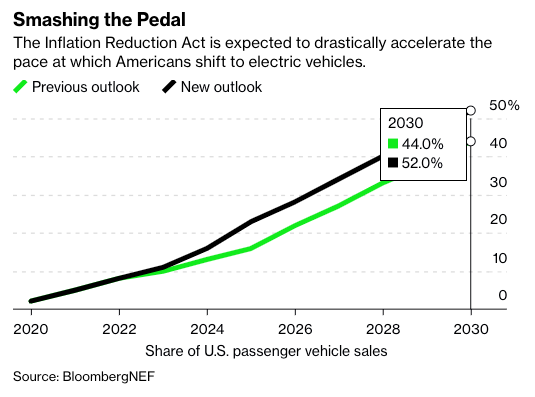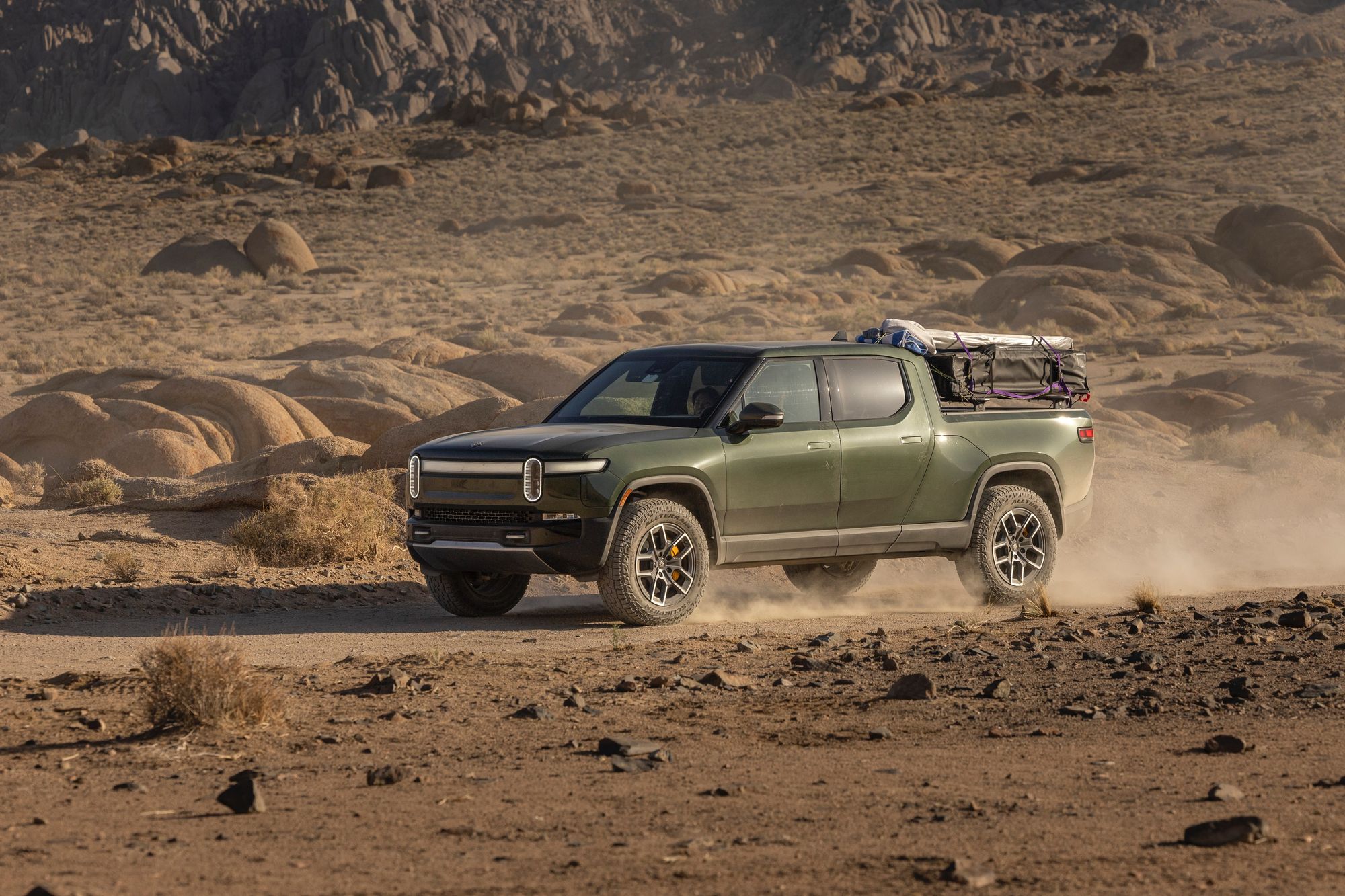Founded in 2009, Rivian Automotive, Inc. is an American manufacturer of electric vehicles and provider of automotive technologies. Its car are built on a so-called skateboard platform that can accommodate future vehicles or be adopted by other automotive companies.
- Currently, Rivian is developing and selling an electric sport utility vehicle (SUV) and an electric pickup truck
- As part of a collaboration with Amazon, a delivery van powered by electricity is also being developed
- By the end of 2023, the business hopes to have an exclusive charging network established across the US and Canada

AVERA MOTORS, THE SPORTS CAR COMPANY
The company was founded in 2009 by Robert Scaringe and was first called "Mainstream Motors". The company would later be renamed "Avera Motors" and finally "Rivian Automotive" in 2011. Rivian's first car model was intended to be an hybrid sports car. This vehicle, named the R1, was prototyped as a mid-engine hybrid coupe for the U.S. market, designed by Peter Stevens. However, it was shelved in late 2011 as Rivian looked to reposition its business in an effort to have a larger impact on the automotive industry.
- Rivian received a large investment in 2015 and opened research facilities in Michigan and the Bay Area
- Shortly thereafter, Rivian began working exclusively on electric autonomous vehicles and also began gearing its prototypes toward the "ride-sharing and driverless car markets"
- All the while, the company was being know for being extremely secretive and only teasing some of its products - of which none were commercialised
"Florida-based Avera Motors is beginning to part the veil of secrecy surrounding what the company has been up to for the past few years. [...] and until now, we've only had one very info-light web site and a handful of rumors to give us an idea of what to expect from Avera." by Autoblog Staff in 2010
IN TESLA'S FOOTSTEPS
By September 2016, Rivian was negotiating to buy a manufacturing plant formerly owned by Mitsubishi Motors in Normal, Illinois. In January 2017, Rivian acquired the plant and its manufacturing contents for $ 16 million and turned it into its primary North American manufacturing facility.
- Rivian's acquisition of a near production-ready facility instead of building a new factory has been likened to Tesla's acquisition of the NUMMI plant in California
- In December 2017, Rivian revealed its first two products: an electric five-passenger pickup truck and an electric seven-passenger SUV, provisionally named the A1T and A1C, respectively
- In November 2018, the truck and SUV were renamed the R1T and R1S, respectively, and unveiled at the LA Auto Show
- Both vehicles were described as ready for rough terrain and semi-autonomous, and the company outlined a plan for its next generation of models to be fully autonomous
THE RIVIAN ECOSYSTEM
Rivian's direct-to-customer model allows it to manage all sales, deliveries, service operations, and resale in-house, without reliance on a dealership network or other third parties. It employs an integrated, digital-first strategy that is convenient and transparent for its customers, but also efficient and scalable to support its growth and still nascent operations. Rivian believes that its website and mobile app facilitate brand engagement, product discovery, demo drives, purchase transactions, vehicle deliveries, vehicle service, account management and resale. The Rivian ecosystem consists of the following components, with data, scale and vertical integration providing positive feedback loops:

- Vehicle Technology: A secure, reliable, scalable combination of hardware and software, connecting its proprietary in-vehicle systems, including vehicle electronics, battery, electric drive, chassis, Driver+, and experience management
- Rivian Cloud: Rivian's architecture of interconnected software applications designed to deliver seamless, end-to-end digital commerce solutions and experiences across web, mobile, and app. Rivian Cloud enables FleetOS, remote diagnostics, OTA software updates, and remote vehicle controls, including vehicle access
- Product Development and Operations: Its vertically integrated product development and operations functions include design, development, manufacturing, sales, delivery, service, and charging. These distributed functions serve the unique needs of its customers. As of September 30, 2021, it operated six service centers in four states (California, Illinois, Washington, and New York), 11 mobile service vehicles, a 24/7 service support center in Michigan, and has secured 24 RAN DCFC sites in seven states, 145 Rivian Waypoints charging sites in 30 states, and 20 service center locations for further expansion
- Data and Analytics: Its ecosystem is interconnected by its proprietary data and analytics backbone housed in Rivian Cloud. It is comprised of a centralised data lake and analytics tools, providing valuable insights that can be applied to continuously improve ecosystem-wide performance, functionality, and uptime to drive increased customer satisfaction

THE MARKET
Rivian believes the convergence of key trends, including shifting consumer preferences and targeted regulatory support, are contributing to the robust demand for EV products and services.
- EV Adoption is at the Tipping Point: EV adoption is accelerating as consumers and businesses better understand the wide-ranging product and environmental benefits of EVs. Declining battery costs are positioning EVs to rapidly reach cost parity with traditional ICE vehicles. With the cost of EV ownership no longer a significant barrier to purchase, Rivian believes there is an opportunity for approximately 90 million light vehicles to be sold globally each year to transition to EVs
- Regulatory Requirements and Incentives Promote EV Adoption: Governments are incentivising or mandating the sale of EVs and eliminating the sale and usage of ICE vehicles through targeted policies. To date, approximately 17 countries have either passed or are considering legislation to phase-out the sale of ICE vehicles between 2025 and 2050. The United States as well as several countries in Europe and Asia offer both financial and non-financial benefits to EV owners, such as tax credits and improved roadway access
- Trucks and SUVs Are the Fastest Growing and Most Profitable Automotive Segments: Trucks and SUVs comprise over 70% of new vehicle sales in the United States and account for most of the profits generated by incumbent automobile manufacturers
On top of this, Bloomberg projects that more than half of cars sold in the U.S.A. by 2030 will be EVs.
- This is supported by large government grants and subsidies to help consumers and companies move toward EVs

"Just over half of passenger cars sold in the US will be electric vehicles by 2030, according to a report from BloombergNEF, thanks in part to consumer incentives included in the $374 billion in new climate spending enacted by President Joe Biden." By Zahra Hirji, Todd Woody, Kyle Stock, and Ira Boudway for Bloomberg
FOUNDER-LED MANAGEMENT
Rivian was founded by Robert Scaringe in 2009. He is currently the CEO and Chairman of the Board of Directors. Clair McDonough is the CFO of the company and previously worked at J.P. Morgan.
- Dr. Scaringe founded Rivian in June 2009
- Has since served as Rivian's Chief Executive Officer and is member of the board of directors
- Holds a B.S. from Rensselaer Polytechnic Institute and an M.S. and Ph.D. in Mechanical Engineering from the Sloan Automotive Laboratory at the Massachusetts Institute of Technology
- Served as Chief Financial Officer since January 2021. Before Rivian, McDonough was a Managing Director and Co-head of Disruptive Commerce at J.P. Morgan where she worked from September 2014 to January 2021. From June 2013 to August 2014, McDonough worked as Vice President and Treasurer and Senior Director of Finance and Strategy at Fairway Market, a food retailer
- She holds a B.A. in Public Policy and Visual Art from Duke University and an M.B.A. from the University of Chicago Booth School of Business
- Served as Chief Growth Officer since October 2020. In this role, Behl leads Brand, Sales & Marketing, Digital, and Strategy & Corporate Development at Rivian
- Prior to that, he served as Rivian's Chief Strategy Officer from March 2016 to October 2020, responsible for the development of Rivian's strategic roadmap and associated business plans. Before Rivian, Behl was a Principal at Roland Berger, serving in its global automotive practice and as a member of the management team for North American operations, from October 2009 to February 2016
- Behl holds a B.Eng. from Visvesvaraya Technological University, India, and an M.B.A. from the University of Chicago Booth School of Business
TAKE A BREATH
So… This is a lot of information. Let’s summarise:
- Founded in 2009, Rivian is an American manufacturer of electric vehicles and provider of automotive technologies
- Its car a built on a so-called skateboard platform that can accommodate future vehicles or be adopted by other automotive companies
- Currently, Rivian is developing and selling an electric sport utility vehicle (SUV), an electric pickup truck
- As part of a collaboration with Amazon, a delivery van powered by electricity is also being developed
- Rivian's direct-to-customer model allows it to manage all sales, deliveries, service operations, and resale in-house, without reliance on a dealership network or other third parties
- It employs an integrated, digital-first strategy that is convenient and transparent for its customers, but also efficient and scalable to support its growth and still nascent operations
- Robert Scaringe, Rivian's founder is currently the CEO and Chairman of the Board of Directors. Clair McDonough is the CFO of the company and previously worked at J.P. Morgan
FINANCIAL CHECK
Sales for the Q2 of 2022 reached $ 364m while cost of sales stood at $ 1,068m leaving a gross profit of $ -704m. The company had R&D expenses of $ 543m and SG&A expenses of $ 461m for a total loss from operations of $ 1,708m.
- The company had $ 14.9B in cash on its balance sheet as of June 30, 2022. Down from $ 18.1B as of December 31, 2021
- The company expects this cash to be sufficient to fund its operations until at least 2025
"The company said it’s confident that cash is enough to fund its operations until it launches its upcoming smaller product platform, called R2, at its new factory in Georgia in 2025." by John Rosevear for CNBC
THE BOTTOM LINE
The Good
- Rivian is a rapidly growing EV manufacturer active in the lucrative and attractive pick-up and SUV segments
- The company has a strong order book, partnerships with leading tech and automotive companies
The Bad
- As for many other EV manufacturers, the valuation of the company is out of touch with economic reality
Disclaimer
Please note that this article does not constitute investment advice in any form. This article is not a research report and is not intended to serve as the basis for any investment decision. All investments involve risk and the past performance of a security or financial product does not guarantee future returns. Investors have to conduct their own research before conducting any transaction. There is always the risk of losing parts or all of your money when you invest in securities or other financial products.
Credits
Photo by Stephen Leonardi on Unsplash.






